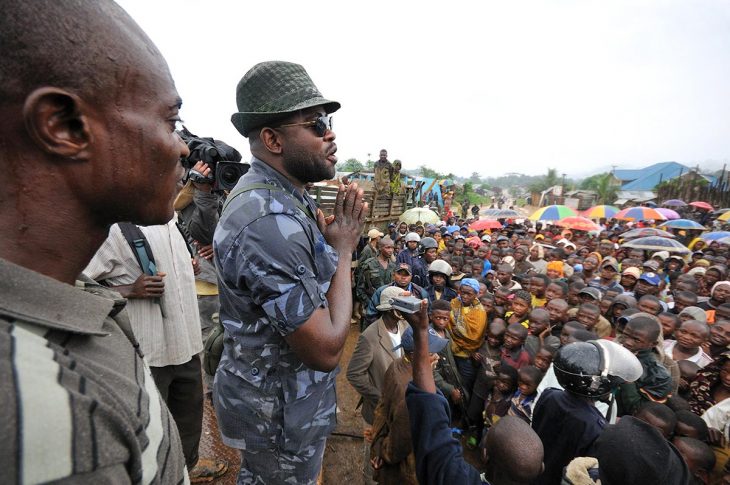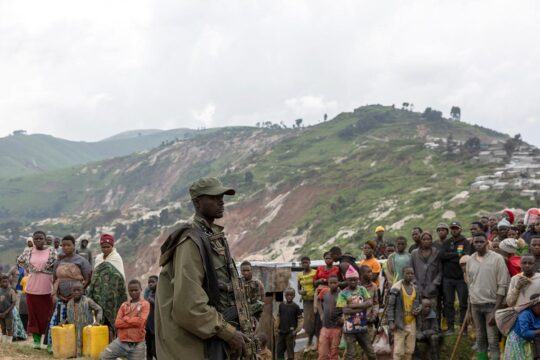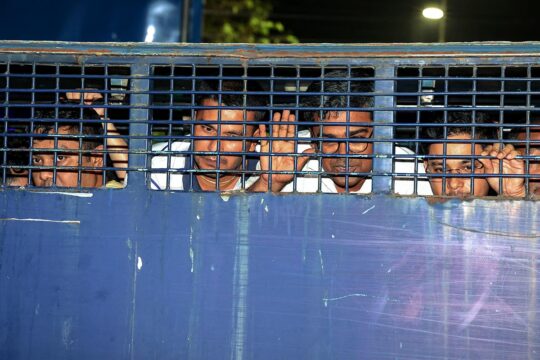His real name is Ntabo Ntaberi but he is better known as Sheka. In the territories of Walikale and Masisi, eastern Democratic Republic of Congo (DRC), the mere mention of his name and his militia Nduma Defence of Congo (NDC) -- also known as the Sheka Mayi Mayi -- made civilians quake, especially women.
The women in this part of North Kivu are certainly not at the end of their ordeal because forces of the fearsome warlord still circulate in these forested areas. But on November 23, those Congolese women might have been given some hope: the powerful Sheka has been sentenced to life imprisonment, two years after the opening of his landmark trial.
Sitting in Goma, the Operational Military Court of North Kivu found him guilty of war crimes for murder, rape, sexual slavery, enlisting children under 15, looting and destruction of property. For each of these crimes he was sentenced to life imprisonment. The court concluded that the NDC militia is a creation of Ntabo Ntaberi and that he was the commander of this armed group at the time of the events.
Sheka's main co-defendant, Nzitonda Habimana Séraphin, known as Lionceau, was also sentenced to life imprisonment for war crimes and crimes against humanity. Another militiaman was sentenced to 15 years in prison, while the fourth was acquitted.
Judges spare the State
Dressed in a blue-yellow T-shirt, arms folded over a strong chest, round face, Sheka showed no reaction during the reading of the judgment which lasted several hours. "We are disappointed. Throughout the trial, we asked the court to organise a visit to the areas where the acts are supposed to have been committed, but the court refused," Sheka's lawyer Alexis Olenga told Justice Info in reaction. "More serious still, our client is being tried by the operational military court, a body that does not allow a double degree of jurisdiction," he added, deploring the impossibility of appealing.
Civil parties, however, are happy. "This is a great day for the victims. Many of them are calling us to express their relief. This condemnation is a strong message for the other warlords," Aimée Fatuma Kahindo, from the victims' lawyers' collective, told the press. She deplored, however, that the judges did not order the Congolese state to pay reparations for failing to protect its population.
Large-scale crimes, large-scale investigations
The events for which Sheka and his men were on trial took place between 2010 and 2014 in several villages in Walikale and Masisi. But it was the village of Luvungi, in Walikale territory, which paid the heaviest price. Located in a relatively prosperous mining area, the villagers were victim of widespread looting by Sheka militiamen from 30 July to 2 August 2010. During his trial, the warlord would explain, without blushing, that this was the price they had to pay for the "protection" his militia offered. Ntabo Ntaberi has always presented himself as the protector of civilians threatened by other armed groups, and not as their executioner. Yet his militia would commit worse than looting in Luvungi. In four days, more than 350 women were systematically raped there, some by several men. "The scale of the attack shocked the international community. It was following these crimes that the United Nations investigated the NDC's actions," said TRIAL International, a Swiss organisation that has been working for years with victims of mass crimes in the DRC.
The crimes of this militia have been documented since 2010 by the United Nations, the Congolese justice system, local and international NGOs. Thousands of testimonies and audiovisual evidence have been collected, some of which have made it possible to establish Sheka's responsibility as a superior of those who perpetrated the crimes.
Witnesses at their own risk
But when the time came for the trial, fear once again took hold of the victim-witnesses. "There are more than 300 victims in this trial, because several villages were attacked - Luvungi, Pinga and others. But the victims who have appeared are no more than fifteen, given the current environment and the security situation in the region. The victims have not only been prevented, but also intimidated by certain people who are said to belong to the families of some of the defendants," Liévin M'vimba, one of the lawyers for the civil parties, told Justice Info.
Daniele Perissi, who heads the Great Lakes programme at TRIAL International, makes the same observation: "Although Sheka surrendered in 2017, his influence remains very real in the territories of Walikale and Masisi. This is one of the reasons why the trial was not held on location, but in Goma, far from the NDC-controlled areas.”
The witness protection system that had been used in previous cases had to be rethought and strengthened. "The plan for the protection of victims and witnesses was one of the most ambitious ever deployed in North Kivu," says Daniele Perissi. "It included the complete anonymity of individuals, the confidentiality of their movements to Goma to testify and the provision of a close guard. After their hearing, each individual was offered a short- or medium-term relocation plan, as needed, to avoid possible reprisals in their village."
Guidon, warlord at large
The conviction of Sheka and two of his co-defendants does not put an end to the martyrdom of the civilian populations of the Walikale and Masisi territories. But NGOs hope that it will be heard as a warning to other rebel commanders, such as Shimiray Mwisha Guidon, former right-hand man of Ntabo Ntaberi. Under an arrest warrant issued a year ago by Congolese military justice, Shimiray Mwisha Guidon is wanted for "participation in an insurrectional movement", "war crimes by recruitment of children" and "crimes against humanity by rape". These crimes have been committed since 2009 in several localities in the territories of Walikale, Masisi and Lubero, first between 2009 and 2014, when Guidon was Sheka's second in command, and since 2014, when Guidon has been leading with an iron fist his NDC-Rénové militia, a dissident faction of Sheka's NDC.
"Both were such strong men that everyone thought they were untouchable. The trial that has just ended proves that Sheka is not above the law, any more than Mr. Shimiray who will one day have to answer for his actions," hopes Elsa Taquet, TRIAL International's legal counsel.
For Jackson Bwahasa, a researcher in conflict dynamics in eastern DRC, however, it is not enough to neutralize Sheka and Shimiray. "One leader is arrested, another is reborn, the group remains and continues to commit the same atrocities, and civilians continue to suffer,” he says. “To ensure an end to the crimes, state authority must be re-established, and the actors of violence must be addressed." A prospect which, although promised by Congolese President Félix Tshisekedi, still seems remote for people in the east of the country, where local and foreign armed groups continue to loot, rape and kill every week, sometimes with the complicity of elements of the regular army.






